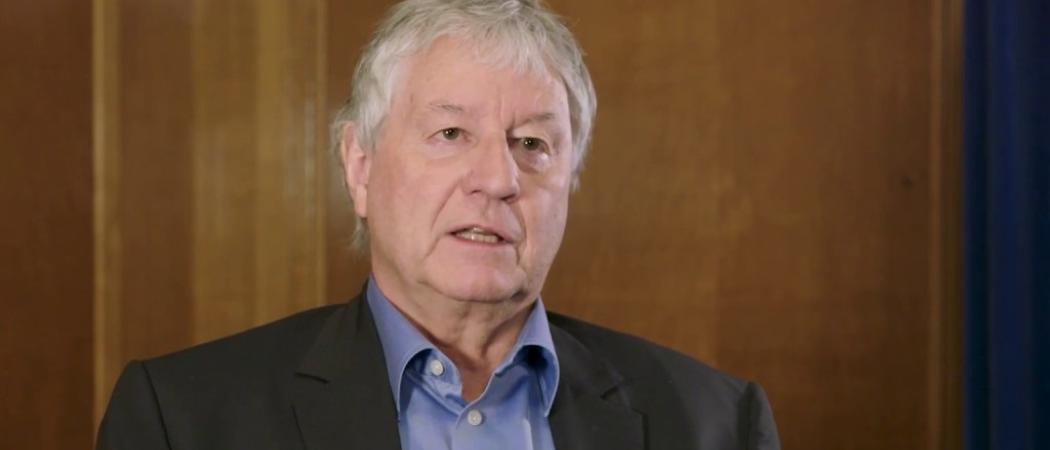Author of government report on Brexit contingency planning for science says UK will need new research funding body, an immigration policy overhaul and money for a wide ‘talent hunt’ if country crashes out of EU

Photo: University of London
The author of a forthcoming government report addressing the impacts of a no-deal Brexit for science says the UK would have to create a “bigger and brighter” global rival to the European Research Council (ERC) if it leaves the EU without an agreement.
Adrian Smith, director of the Alan Turing Institute in London, says the government would have no choice but to replicate the ERC if the UK is locked out of the next EU research programme, Horizon Europe.
“Suppose there’s no access to the ERC after Brexit, we will have to invent our own. It’ll have to be bigger, brighter and pay better than the ERC,” Smith told an audience at Imperial College London on Tuesday.
Previewing his report, Smith said the “uniform” feedback he has received from UK researchers is that the end of access to ERC, with its large grants and backing for basic research, would be the aspect of leaving the EU with no deal that creates the biggest hole.
He proposes the UK version of ERC would be run by an international organisation and open to anyone in the world as well as scientists based in the UK. The government would have to “see if we could do partnerships with other countries on this,” Smith said.
The UK government wants to fully associate to the €94.1 billion Horizon Europe programme, which starts in 2021, and is prepared to pay its way in. However, it is feared a disorderly exit from the EU could sever the UK’s close science relationship with the EU-27.
The European Commission’s former director general of research, Robert-Jan Smits, told The Guardian newspaper earlier this week that the UK has “zero chance” of negotiating associate membership to Horizon Europe if it leaves without a deal on 31 October.
Smith said the possibility of UK-based scientists being denied access to the ERC and other major funding streams in Brussels had increased since he began working on his report back in March.
“The ‘what if’ scenario might be turning into the actuality. It’s less hypothetical than it was when I embarked on it,” he said.
Smith is due to meet the UK science minister Chris Skidmore next Monday to discuss the report and a possible date for its publication. For now, he said he could only, “hint heavily at the conclusions”.
He has come up with “a big vision” for how the UK’s research system could meet the challenge of Brexit, including relaxing immigration restrictions on scientists and a new “agility fund” to quickly seed new opportunities that arise unexpectedly.
“We need to totally reverse our insane migration policies,” he said. “We also need funding to hunt talent.”
Flexible visas for researchers would make the UK “a global magnet”. The government is already working on a plan to ease entry to the UK for scientists, he noted.
Smith suggested the Alan Turing Institute’s international fellowship scheme for artificial intelligence researchers, worth £50 million, “could be an exemplar” for initiatives to attract talent in other research areas.
He also expressed admiration for China’s generous scheme for luring scientists back home. “I would copy much of what the Chinese have done in repatriating talent,” he said.
There also is a need to make funding more flexible. Rather than committing all money to existing programmes, there should be slack in the system, leaving the government able to take advantage of new collaboration opportunities as they spring up.
“We don’t have any form of agility. There’s nothing like what you might call an agility fund,” Smith said. “We don’t have access to money we can use to fund collaborations that might come about with the likes of Israel or Singapore.”
Trumpets blaring
The UK gets tens of millions of pounds more each year from EU research funding than it puts in. This accounts for a small proportion of the UK’s overall research investment. “However, this money means a lot to various research groups,” Smith said.
For example, over 30 per cent of research money for UK-based archaeologists comes from Brussels.
The commission’s huge regional investment fund for regions is very important to parts of Wales, Scotland and the North of England, because it acts as a lever for research spending, Smith added.
He warned the money the UK pays for access to EU science programmes would not automatically be available as extra domestic cash for scientists after Brexit.
“There’s no sensible basis for line by line replication of EU funding. If you repatriate that money from the EU, it becomes part of [overall] contestable spending for the government.
“There’s a sense that scientists will have to argue from scratch [for it],” Smith said. In the event of no-deal, science could find itself pushed right down the list of priorities, he added.
“We really will have to make the case to government. There’s a lot scientists can’t afford to get smug about.”
If there is a no-deal separation from the EU, there will need to be rapid push to deliver alternatives for science, Smith argued.
“You need to go out trumpets blaring and guns blazing with a new vision for life after the EU,” he said. “If you don’t make some very serious statements on science, there is going to be a big danger.”





 A unique international forum for public research organisations and companies to connect their external engagement with strategic interests around their R&D system.
A unique international forum for public research organisations and companies to connect their external engagement with strategic interests around their R&D system.